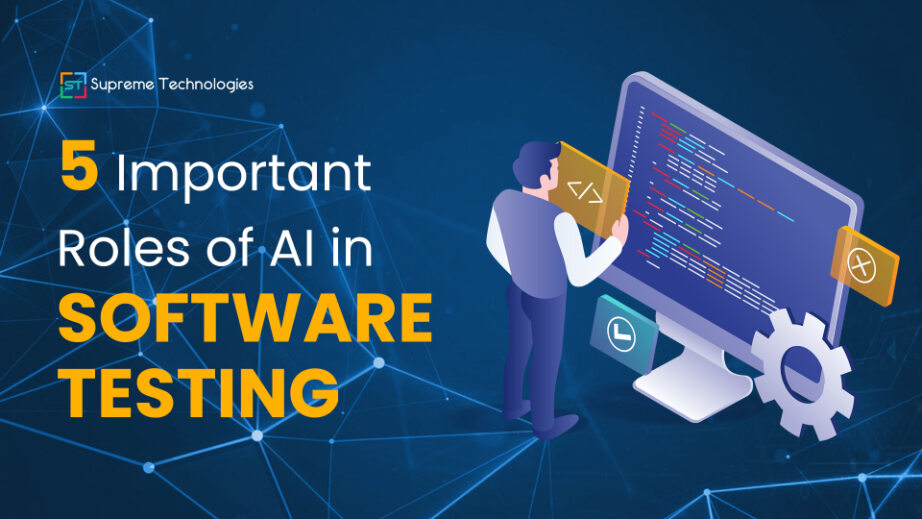AI is game-changing in software texting, making it faster, smarter, and more effective. With the help of AI, testers can automate tasks easily, find potential issues faster than before, and look for vast amounts of data quickly. As we move into 2024, AI is becoming more important in testing. It’ll help you do even harder tasks, so they can release great software faster and with fewer problems. Below, we’ll talk about how AI improves software testing for everyone.
But first, let’s discuss what AI-based testing is!
AI-Based Testing
AI-based testing is a method of testing software that uses AI and Machine Learning (ML) algorithms to make the testing process more efficient and effective. Its main goal is to use logical reasoning and problem-solving methods to improve the overall testing process. In AI-based testing, AI-driven tools are used to execute tests without any human intervention. This means that data and algorithms are used to design and perform tests automatically.
5 Amazing Roles Of AI in Software Testing In 2024

In the ever-evolving landscape of software testing, one revolutionary force is reshaping the way we ensure quality: Artificial Intelligence (AI).
AI-driven tools for software testing can easily check bugs, inconsistencies, and several issues that manual testing could require days or even months. Moreover, these tools can likewise mimic client conduct to guarantee the final result is of the greatest conceivable quality. Here, let’s find out how AI can help the testers to streamline their tasks:
Automated Test Case Generation
One of the key roles of AI in software testing is its ability to generate test cases automatically. Generally, most of the test cases were created by testers manually which was a time-consuming and error-prone process.
Additionally, AI algorithms can analyze software’s requirements, designs, and also code to generate comprehensive test cases, covering various scenarios and edge cases.
Moreover, AI can prioritize and optimize test cases based on various factors like risk, code complexity, and previous test results. This enables testers to focus their efforts on the most critical parts, increasing the effectiveness of the testing process while minimizing redundant or low-impact tests.
Defect Prediction and Prevention
AI in software testing easily predicts and prevents defects before they can occur. By checking historical data, code changes, and other factors AI models can predict the defects in certain areas of the codebase. By getting this information testers can write cleaner and create strong code from the outset.
Self-Healing Test Automation
AI-powered test automation frameworks can automatically adjust test scripts based on the changes in the application’s user interface or functionality. Then, such frameworks use machine learning to determine and modify test scripts which lessens the need for manual updates and help, ensuring that automated testing is perfect and reliable.
Natural Language Processing (NLP) or Requirements Analysis
Typically, NLP algorithms assist computers in understanding and reviewing documents that are written in everyday language. They can easily address mistakes and unclear things in the requirements, ensuring everything makes sense. This way, it can make the perfect test for software so it works well and does not have any issues.
Performance Testing and Optimization
Performance is one of the critical aspects of any software application and AI is playing an important role in ensuring optimal performance. The AI-powered tools analyze app performance data, determine performance bottlenecks, and also provide several insights for optimization. Such tools can simulate real-world usage scenarios, stress test the application, and identify areas for improvement. Doing so ensures a smooth and responsive user experience.
Advantages of AI in Software Testing
AI offers numerous benefits in software testing below we will mention one by one:
Improves Test Coverage and Efficiency
Because of time conflicts and human limitations, traditional testing methods usually struggle to cover all possible things during the software development process. However, machine learning algorithms can automatically generate various test cases such as uncommon scenarios and edge cases, lowering the risk of undetected critical issues. Apart from this, AI in software testing can easily replicate test cases, so it can minimize false positives and negatives in defect identifications.
AI Can Decrease Manual Efforts And Faster Testing Cycles
AI-powered tools can automate time-consuming tasks. These are:
- Creating test cases
- Preparing test data
- Updating test scripts
Well, this automation improves productivity and enables testers to focus on other complex tasks where human expertise is crucial.
Moreover, AI in software testing can identify the most relevant tests based on code changes as per developer feedback. The result is a dramatic time reduction in your software development timeline, enabling software teams to rapidly release updates and new features.
AI Can Improve Efficiency in Defect Detection
Well, traditional testing methods may miss minor or complex defects in large and tough codebases. This is where AI can help, with large algorithms it can easily identify hard-to-detect issues.
AI analyzes historical data and current software metrics to find error-prone areas. This way, testers can focus on parts of the applications that mostly have defects.
Moreover, AI-driven tools can also learn from past testing cycles and improve them to detect defects. By doing so, it will easily adapt to evolving software complexities and maintain top-quality standards.
AI Can Enhance User Experience
AI in software testing can improve the user experience. Generally, AI-driven tools can simulate real-life user scenarios and interactions which can help in gaining valuable insights into the experience that users have while using your software. It involves testing under several conditions and on multiple devices, ensuring the software performs the best in all expected user environments.
Apart from this, AI can determine usability issues like complex navigation, and unresponsive elements which are tough for testers to determine. By knowing these complex issues, AI helps you to create more user-friendly and intuitive software applications, offering a better user experience.
Conclusion
In the year 2024, the role of AI in software testing has changed significantly. It offers numerous benefits to agencies striving to deliver top-quality software in today’s competitive market. AI helps with making tests automatically, deciding which tests are most important, predicting issues, fixing test problems by itself, and checking if the software meets the requirements using natural language processing. By using AI in these ways, companies can make their testing work better, faster, and more reliable. This can lead to happier customers and more successful businesses.
Discover more about our top-notch services at Supreme Technologies.

